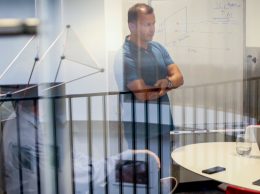FastSpring revenue soars on e-commerce
IN THIS ARTICLE
- Top Stories Topic
- Stephen Nellis Author
By Stephen Nellis Monday, January 11th, 2010
Dan Engel had to learn the lessons that helped him build Santa Barbara-based FastSpring the hard way, but those lessons have paid off with 550 percent revenue growth over the past year.
The 15-employee firm makes an e-commerce backend for companies that sell downloadable products such as software, e-books and video games. Companies who sell files face some special challenges, such as matching up serial numbers and authorization codes for digital rights management and distributing back-up discs.
Those go along with the usual e-commerce tasks of handling payments, collecting state and foreign taxes and dealing with coupons, rebates and price testing. But when Engel was building a photo software company, he couldn’t find an off-the-shelf product to meet his needs.
“There are a host of other services we’re providing along with just the payment processing that if vendors try to accomplish themselves, they’ll spend a year or two. Pretty soon you’re in the e-commerce business rather than in the software business,” Engel said. “Part of how I know that is that I did build an e-commerce system specific to one software company, and it took me about two years.”
That company was Morpheus, another of Engel’s companies that makes software for blending and morphing photographs together in digital animations. He gained some experience in photo software heading market development at Picasa, a photo-sharing site acquired by Google. Before Engel struck out on his own, he had also headed online sales for Google and left shortly after its initial public offering, and then worked online sales for what later became Citrix Online in Goleta.
Engel and three co-founders started FastSpring in 2005 with their own money. Last year, the 15-employee firm pulled about $15 million in revenue, Engel said.
With FastSpring, Engel is working to smooth the path for sellers of downloadable products, and has seen his firm catch on with everything from videogame and e-book sellers to financial researchers selling PDF reports. Part of the hook is offering ways to make life easier for the sellers, such as handling foreign payments through FastSpring’s own merchant accounts to avoid extra fees and handling the increasingly complex collection of taxes. Software products permeate borders much more readily than physical products, and California and New York have approved online sales taxes, as have many countries in Europe.
“All the money needs to be sent to the tax collection folks in the European Union, who need to be told which counties get money and how much money each gets,” Engel said. “It gets pretty complicated. We went through it all ourselves [with Morpheus].”
But Engel said the key to FastSpring’s success hasn’t been its technical tricks, but rather its old-fashioned customer support. When a client or a client’s customer has a problem, a human being at FastSrping responds within 12 hours and more often with one or two hours — even on nights and weekends.
“We’re kind of nuts about customer support. We’re the kind of geeks who vendors want supporting them,” Engel said. FastSpring’s customer support specialists “work in the night time. They don’t sleep much,” he said.
E-commerce has proved a resilient place to be, even during the recession. According to the U.S. Census Bureau, e-commerce sales for the third quarter of 2009 were $34 billion, up 1.8 percent from the year before even as total retail sales decreased 7.5 percent over the same period.
“Online retail sales have been until recently growing in the range of 20 percent,” said Jeffrey Grau, an senior analyst with New York-based eMarketer, a firm that studies e-commerce. “The recession knocked that down quite a bit, but it also knocked down total retail sales.”
Though big, consumer-facing e-commerce names such as e-Bay and Amazon may have become household names, Grau said there’s still room for market-share battles and revenue snatching in narrower parts of the industry.
“The low-hanging fruit are the ideas that appeal to a lot of people. Once those are covered, the thing to look for is specialties and niches,” Grau said. “It takes more research to understand the particular business model.”
In both business-to-consumer and business-to-business e-commerce, mobile phones are a growing target. FastSpring has been taking advantage of that – after all, its e-commerce back-end is basically an app store. Some of its clients are already selling mobile apps, such as Moonrug, a company that makes an app to link a Google-powered Android phone into a Microsoft Exchange e-mail server.
As for FastSpring’s growth and long-term plans, Engel said an acquisition or IPO is in the future – but not anytime soon.
“We’ll be much more valuable in the future,” Engel said. “We don’t expect to grow 550 percent every year. But we’re really at a place where, while we’re doing a lot of active sales, we don’t have to to get new clients, because our existing clients are generating enough buzz.”
Are you a subscriber? If not, sign up today for a four-week FREE trial or subscribe and receive the 2010 Book of Lists free with your purchase.











